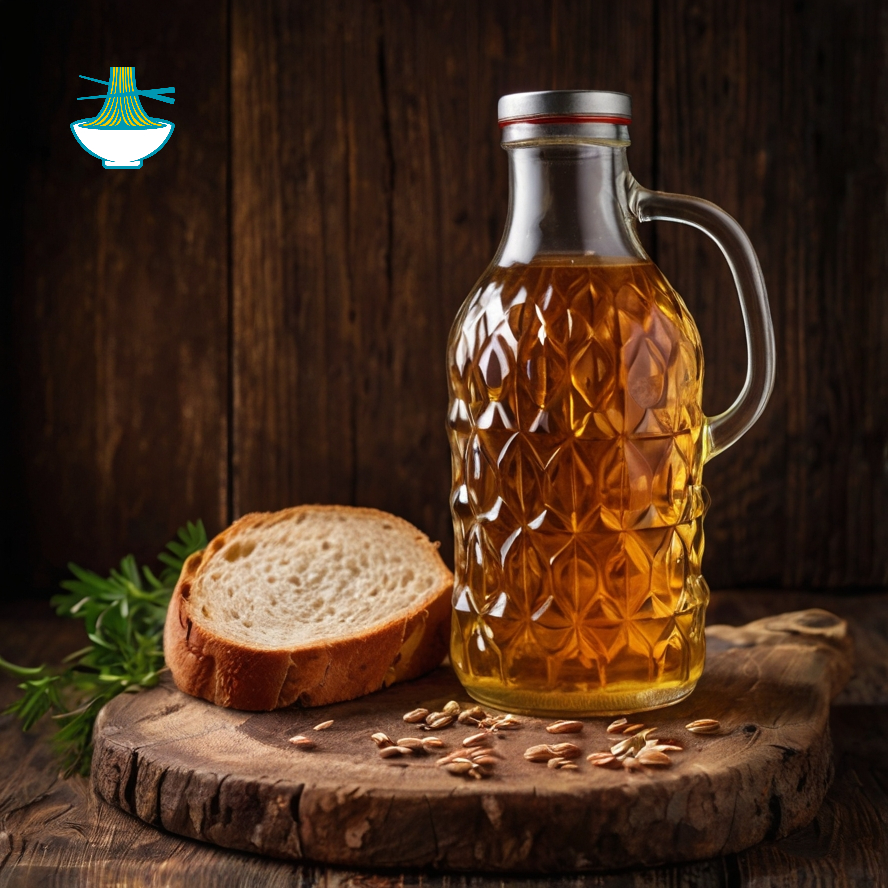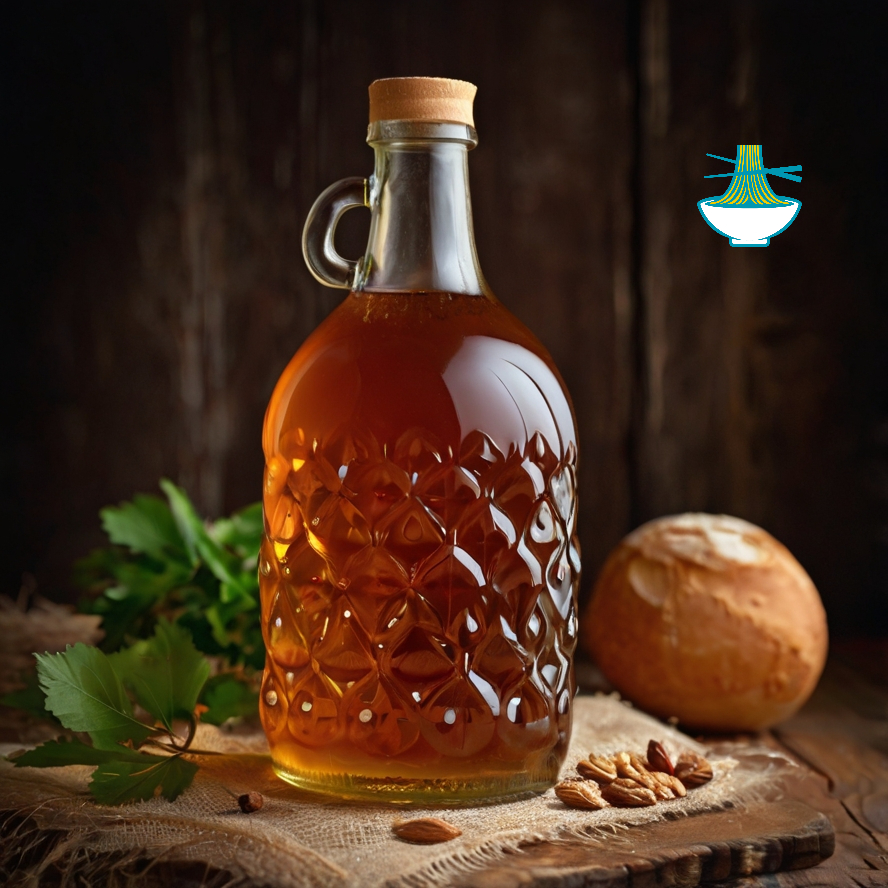Gira is a traditional Lithuanian fermented bread beverage, similar to kvass, known for its refreshing taste and health benefits. Made from fermented rye bread or wheat bread, it undergoes a natural fermentation process that results in mild carbonation and a unique tangy flavor with a hint of sweetness. Rich in probiotics, Gira supports digestive health and gut health. It is also low in alcohol, making it an ideal thirst-quencher, especially on hot days. While low in calories, moderation is advised due to the alcohol content that may result from fermentation. This nutrient-packed drink, offering a glimpse into Lithuania's rich culinary traditions, benefits your overall well-being while connecting you to a piece of Lithuanian culture.
Ingredients:
- 1 loaf of dark rye bread (500g)
- 5 cups water
- 2 tablespoons sugar
- 1 teaspoon active dry yeast
- 1-2 tablespoons raisins (optional for added sweetness)
- 1 tablespoon lemon juice (optional for extra tang)
Instructions:
- Slice the rye bread into thick pieces and toast them in the oven until they are dark and crunchy, but not burnt.
- Boil 5 cups of water and pour it over the toasted bread slices. Let it sit for about 10-15 minutes to soak.
- Strain the mixture through a fine sieve or cheesecloth into a clean bowl, pressing out as much liquid as possible from the bread.
- Add sugar to the liquid and stir until it is dissolved. Allow the mixture to cool to room temperature.
- Once cooled, dissolve the yeast in a small amount of warm water and add it to the liquid. Mix well.
- Cover the bowl with a clean cloth and let the mixture ferment for 24-48 hours at room temperature. The longer it ferments, the stronger the flavor will be.
- If desired, add raisins and lemon juice during the fermentation process for added flavor.
- Once fermented to your liking, strain the liquid again and transfer it to bottles. Refrigerate to stop the fermentation process.
- Serve chilled, and enjoy the refreshing taste of homemade Gira!
The Impact of the Fermentation Process on Flavor and Nutrition
- Fermentation plays a crucial role in transforming Gira from a simple bread-soaked liquid into a carbonated and mildly tangy beverage. During the fermentation process, natural sugars in the bread are converted into alcohol and carbon dioxide. This gives Gira its light effervescence, which makes it both refreshing and mildly alcoholic.
- In addition to the carbonation, fermentation promotes the growth of probiotics, which are beneficial bacteria that can help improve digestion, boost the immune system, and promote overall gut health. The longer the fermentation period, the more pronounced the sour flavor becomes, which adds a unique complexity to the drink.
Note:
Risks and Considerations
While Gira is generally considered a healthy beverage, it contains a small amount of alcohol due to the fermentation process. The alcohol content is usually very low, but it may vary depending on the length of fermentation. For this reason, Gira should be consumed in moderation, particularly by pregnant women, children, or individuals with health conditions that may be affected by alcohol consumption.
It is important to note that Gira, although it contains probiotics, is not a substitute for other probiotic-rich foods like yogurt or kefir, which have a more concentrated dose of beneficial bacteria.
How to Store Gira for Longer Shelf Life
If you want to prepare Gira in advance, it’s important to store it correctly to prevent further fermentation. After bottling, refrigerate the beverage to slow down the fermentation process and preserve its taste. Gira can typically be stored in the fridge for up to a week. If stored at room temperature for extended periods, the fermentation process will continue, leading to a more sour and stronger alcoholic flavor.
Frequently Asked Questions (FAQs)
1. Can I use other types of bread to make Gira?
- Yes, while the traditional recipe calls for dark rye bread, you can experiment with other types of bread such as whole wheat or multigrain. However, this may alter the flavor and nutritional profile of the final product.
2. Is Gira suitable for individuals with gluten sensitivity?
- Since Gira is made from rye bread, which contains gluten, it is not suitable for those with celiac disease or severe gluten sensitivity. However, for those with mild gluten sensitivity, the fermentation process may break down some of the gluten, though it is not completely gluten-free.
3. What is the alcohol content of Gira after fermentation?
- The alcohol content of Gira is generally very low, ranging from 0.5% to 2%, depending on the length of fermentation. The longer it ferments, the higher the alcohol content. It is important to consume Gira in moderation, especially if you are avoiding alcohol.
4. Can Gira be made without sugar or with alternative sweeteners?
- Yes, Gira can be made without sugar or with alternative sweeteners such as honey, stevia, or agave syrup. However, the sweetness level will vary depending on the substitute used, and it may affect the fermentation process slightly.
5. Is Gira suitable for people following a low-calorie diet?
- Gira is relatively low in calories, especially compared to sugary sodas or juices. However, it does contain sugar, so if you're on a low-calorie or low-sugar diet, it should be consumed in moderation. The total calorie count per serving can vary depending on the added sweeteners.
6. How long should Gira be fermented to get the best flavor?
- Gira can be fermented for anywhere from 24 to 48 hours. A shorter fermentation time results in a milder, sweeter flavor, while a longer fermentation period will yield a more sour and tangy taste. The ideal fermentation time depends on your personal taste preferences.
7. Can Gira be considered a dietary supplement?
- Gira is rich in probiotics, making it beneficial for gut health. However, it should not be relied upon as a sole source of probiotics. While it may offer digestive benefits, it cannot replace more concentrated probiotic products like yogurt or kefir.

Nutritional values and benefits
1 Loaf of Dark Rye Bread (500g)
- Calories: 1,200
- Carbohydrates: 240g
- Protein: 30g
- Fat: 10g
- Sodium: 1,200mg
Nutritional Benefit: Rye bread is a good source of fiber and B vitamins, which promote digestive health and provide sustained energy. It also contains antioxidants that support immune function.
5 Cups Water (1.2L)
- Calories: 0
- Carbohydrates: 0g
- Protein: 0g
- Fat: 0g
- Sodium: 0mg
Nutritional Benefit: Water is essential for hydration, digestion, and the overall functioning of the body. It is necessary for maintaining balance in bodily fluids and supporting all metabolic processes.
2 Tablespoons Sugar (25g)
- Calories: 100
- Carbohydrates: 25g
- Protein: 0g
- Fat: 0g
- Sodium: 0mg
Nutritional Benefit: Sugar provides quick energy, but should be consumed in moderation as it can contribute to weight gain and spikes in blood sugar levels.
1 Teaspoon Active Dry Yeast (3g)
- Calories: 9
- Carbohydrates: 1g
- Protein: 1g
- Fat: 0g
- Sodium: 0mg
Nutritional Benefit: Yeast is a source of B vitamins, particularly B1 (thiamine) and B3 (niacin), which are important for energy production and maintaining healthy skin, hair, and eyes.
1-2 Tablespoons Raisins (Optional, 30g)
- Calories: 80
- Carbohydrates: 21g
- Protein: 1g
- Fat: 0g
- Sodium: 2mg
Nutritional Benefit: Raisins provide a natural source of sugar and are rich in iron, helping to support healthy blood and prevent anemia. They also contain antioxidants that promote heart health.
1 Tablespoon Lemon Juice (Optional, 15g)
- Calories: 4
- Carbohydrates: 1g
- Protein: 0g
- Fat: 0g
- Sodium: 0mg
- Vitamins: Vitamin C: 10mg (17% DV)
Nutritional Benefit: Lemon juice is rich in vitamin C, which supports immune function and skin health, and has antioxidant properties.
Summary of Nutritional Benefits:
Gira is a refreshing, probiotic-rich beverage that provides hydration and digestive benefits. The rye bread offers fiber and B vitamins, while the yeast adds B vitamins that help with energy production. Raisins contribute antioxidants and iron, which support blood health, and the lemon juice enhances the flavor while providing a boost of vitamin C. Although Gira is naturally low in calories, it should be consumed in moderation due to its sugar content and slight alcohol content from the fermentation process. This beverage is perfect for those looking for a healthy, flavorful drink that also aligns with traditional Lithuanian cuisine.


Comments